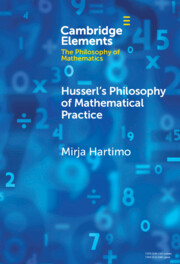Element contents
Husserl's Philosophy of Mathematical Practice
Published online by Cambridge University Press: 04 December 2024
Summary
Keywords
- Type
- Element
- Information
- Online ISBN: 9781009165709Publisher: Cambridge University PressPrint publication: 16 January 2025
References
- 4
- Cited by

